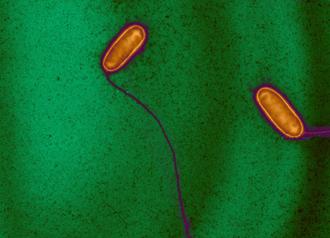Scientists at the Institut Pasteur, the CNRS, the Institut Curie and Inserm have identified a unique mechanism that enables the bacterial pathogen Legionella pneumophila (the causative agent of Legionnaires’ disease or legionellosis) to "reprogram" the gene expression of the eukaryotic cells that it infects. This mechanism, which has never been observed before, facilitates the survival and proliferation of Legionella pneumophila during infection. The work provides precious information on the regulation of the host’s gene expression, as well as important insight into the tactics used by bacteria to manipulate host cells. This research is published online on April 17, at the Cell Host & Microbe website.
Press release
Paris, April 17, 2013

The teams of Carmen Buchrieser, head of the unit Biology of the Intracellular Bacteria at the Institut Pasteur and associated to CNRS, and Raphaël Margueron, of the Genetics and Developmental Biology Unit (CNRS/Institut Curie/Inserm/Pierre and Marie Curie University), at the Institut Curie, have discovered a previously unknown epigenetic mechanism that enables Legionella pneumophila to alter the gene expression of host cells in order to promote its own development. The scientists are putting forward the theory that there are expression changes in a total of 4,870 host genes. Some of these genes, such as those coding for interleukin 6 or the TLR5 receptor, are directly involved in the innate immune response of the host cell to the infection.
The following mechanism is used by Legionella pneumophila: the bacterium secretes an enzyme called RomA, that modifies the structure and conformation of the host cell's DNA, and this restricts access to many genes. Consequently, the expression of these genes is markedly reduced.
This work sheds new light on the regulation of eukaryotic gene expression (eukaryotes are cells with a nucleus), and therefore on the functioning of eukaryotic cells in general. It also provides information on the strategies employed by intracellular pathogens for survival and development during infection.
--
Illustration - Copyright Institut Pasteur
Caption - Legionella pneumophila, the bacterium responsible for severe acute lung disease.
Sources
Legionella pneumophila Effector RomA Uniquely Modifies Host Chromatin to Repress Gene Expression and Promote Intracellular Bacterial Replication, Cell Host & Microbe, April 17, 2013.
Monica Rolando (1,2), Serena Sanulli (3,4,5), Christophe Rusniok (1,2), Laura Gomez-Valero (1,2), Clement Bertholet (3,4,5), Tobias Sahr (1,2), Raphael Margueron (3,4,5) and Carmen Buchrieser (1,2)
(1) Institut Pasteur, Biology of Intracellular Bacteria,
(2) CNRS UMR 3525, Paris, France,
(3) Institut Curie, Genetics and Developmental Biology Unit,
(4) CNRS UMR 3215,
(5) INSERM U934, Paris, France.
Contact
Institut Pasteur Press Office
Nadine Peyrolo : + 33 (0)1 45 68 81 46
Jérémy Lescène : +33 (0)1 45 68 81 01


